
Music Web
Express 3000 Magazine presents an interview with Kevin Kastning, Sándor
Szabó, and Balázs Major
Music Web Express Magazine; May 2013 (USA)
|
KEVIN
KASTNING,
SÁNDOR SZABÓ AND BALÁZS MAJOR |
||
 A
sonic feast of various stringed fretboard instruments and
percussion, Becoming is the latest recorded chapter
from the international guitar duo of Kevin Kastning and
Sándor Szabó. On the 69 minute, 14 track Becoming both
guitarists are joined by percussionist Balázs Major. Kastning
is one of the most prolific of all the experimental American
guitarists recording in 2013 and both Sándor and Balázs are from
Hungary so this is quite an international musical collaboration.
Even so, the all instrumental fare extends way beyond border
crossings. Recorded on location in March 2012 at the concert hall in
Hungary where the trio were set to perform that night, Becoming
is filled with all the dynamics and musical tension guitar fans
have come to expect from the versatile and always challenging guitar
sound Kastning has brought to the music world with the myriad of
sonic complexities he has recorded over the past decade on his
Greydisc label. Perhaps the most interesting part here—in addition
to the wild guitars and sounds brought to life here—is the sound
that Balázs adds on his percussion instruments which include unusual
instruments such as gongs, udus, and African clay drums. Either way
Balázs never dominates the spotlight, preferring instead to
accentuate the delicate array of unusual acoustic guitars both
Kastning and Sándor so skillfully perform on here—including 12
string bass-baritone guitar, baritone classical guitar (Kastning)
and classical guitar, 16 string guitar, 10 string viola caipira
guitar (Szabó). Kastning also adds some piano and Szabó a chinese
instrument called Guzheng. With their near telepathic guitar
chemistry, Kastning and Szabó, together with percussion master
Balázs Major, arrive with their greatest sonic achievement yet with
the impeccably written, recorded and performed sounds on
Becoming.
www.KevinKastning.com /
www.SándorSzabo.com /
www.Balázs
Major.com A
sonic feast of various stringed fretboard instruments and
percussion, Becoming is the latest recorded chapter
from the international guitar duo of Kevin Kastning and
Sándor Szabó. On the 69 minute, 14 track Becoming both
guitarists are joined by percussionist Balázs Major. Kastning
is one of the most prolific of all the experimental American
guitarists recording in 2013 and both Sándor and Balázs are from
Hungary so this is quite an international musical collaboration.
Even so, the all instrumental fare extends way beyond border
crossings. Recorded on location in March 2012 at the concert hall in
Hungary where the trio were set to perform that night, Becoming
is filled with all the dynamics and musical tension guitar fans
have come to expect from the versatile and always challenging guitar
sound Kastning has brought to the music world with the myriad of
sonic complexities he has recorded over the past decade on his
Greydisc label. Perhaps the most interesting part here—in addition
to the wild guitars and sounds brought to life here—is the sound
that Balázs adds on his percussion instruments which include unusual
instruments such as gongs, udus, and African clay drums. Either way
Balázs never dominates the spotlight, preferring instead to
accentuate the delicate array of unusual acoustic guitars both
Kastning and Sándor so skillfully perform on here—including 12
string bass-baritone guitar, baritone classical guitar (Kastning)
and classical guitar, 16 string guitar, 10 string viola caipira
guitar (Szabó). Kastning also adds some piano and Szabó a chinese
instrument called Guzheng. With their near telepathic guitar
chemistry, Kastning and Szabó, together with percussion master
Balázs Major, arrive with their greatest sonic achievement yet with
the impeccably written, recorded and performed sounds on
Becoming.
www.KevinKastning.com /
www.SándorSzabo.com /
www.Balázs
Major.com
=-=-=-=-=-=-=-=-=-=-=-=-=-=-=-=-=-=-=-=-=-=-=-=-=-=-=-=-=-=-=-=-=-=-
mwe3.com presents an interview with KEVIN KASTNING, SÁNDOR SZABÓ AND BALÁZS MAJOR mwe3: Where does Becoming find you in 2013? Can you fill the readers in on the story behind the making of the Becoming album? It’s such a masterpiece of improvised guitar work. How would you compare your sonic and compositional approach and sound on Becoming to that of your earlier albums including Returning released in 2010, Book Of Crossings and Triptych, the latter of which also featured a trio sound. Where and when was the Becoming album recorded, mixed and mastered? 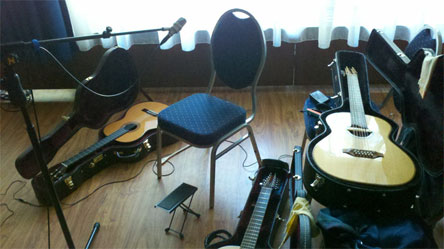 KEVIN
KASTNING: Becoming was recorded on-location during the
2012 European tour in support of the Triptych album. We had
most of one day to record it, and it was all recorded on-location,
in a small concert hall in Vac, Hungary. This was in a large
performance complex; we had a concert in the large hall that night,
but we tracked in the smaller hall. In fact, this was the same
concert hall where the album The Book of Crossings of Sándor
and I was recorded; Becoming was recorded the day before
The Book of Crossings. So Becoming and The Book of
Crossings are in some ways very closely related due to being
tracked on two consecutive days in the same location in the same
atmosphere. The same spirit in our souls was experienced on both
records. Same recording hall, same equipment and instruments. We
wanted to record a new trio album, because Triptych was
recorded on the 2009 European tour, and in the three years since it
was recorded, each of us had grown and developed as artists; not
only individually, but collectively as the trio. All three of us had
added instruments to our palettes; in some cases, these were
instruments we’d invented so they didn’t exist on any other records.
The instrumental fabric of Becoming is quite unique, both on
individual levels and as a trio. KEVIN
KASTNING: Becoming was recorded on-location during the
2012 European tour in support of the Triptych album. We had
most of one day to record it, and it was all recorded on-location,
in a small concert hall in Vac, Hungary. This was in a large
performance complex; we had a concert in the large hall that night,
but we tracked in the smaller hall. In fact, this was the same
concert hall where the album The Book of Crossings of Sándor
and I was recorded; Becoming was recorded the day before
The Book of Crossings. So Becoming and The Book of
Crossings are in some ways very closely related due to being
tracked on two consecutive days in the same location in the same
atmosphere. The same spirit in our souls was experienced on both
records. Same recording hall, same equipment and instruments. We
wanted to record a new trio album, because Triptych was
recorded on the 2009 European tour, and in the three years since it
was recorded, each of us had grown and developed as artists; not
only individually, but collectively as the trio. All three of us had
added instruments to our palettes; in some cases, these were
instruments we’d invented so they didn’t exist on any other records.
The instrumental fabric of Becoming is quite unique, both on
individual levels and as a trio.To compare both of these new records to Returning (2010) is difficult for me. Returning was recorded in the US in 2008 in a recording studio, so the setting, environment, and atmosphere was quite different. Not better or worse; just very different. The spirit between Sándor and I was very strong as ever during those sessions, but The Book of Crossings and Becoming saw four years of growth, development, and forward momentum in each of us since the recording of Returning. SÁNDOR SZABÓ: Actually the 2012 Hungarian tour called Kontaktus was based on the music and sound ideas of the Triptych, our first trio album, but while we played the concerts on the tour we felt that we are different persons and different musicians since the Triptych recording. We had different ideas in our mind and a different feeling to make recordings in a different approach. It is hard to describe but we all became higher level improvisers and we could utilize our chemistry in such an efficient way that we could never do before. The recording session was made in Hungary in a silent small concert hall in my hometown Vác, the environment the vibe was just perfect for the session. The mixing and mastering was done in my own studio. BALÁZS MAJOR: The Becoming’s release is a great feeling, I was looking forward to it. It is a rare thing for a Hungarian musician that he can be a part of such a high quality release which appears in the States. Though this is not the first one for me. It is a great pleasure to share the music with such artists as Sándor, with whom we are partners more than 30 years ago. He was present at all my projects I was involved. We can create in a fantastic freedom. He introduced me to Kevin whose playing made a big influence on me. After he left Hungary (in 2009) I just started to miss him. Then when I heard that we can work again I prepared very intensively to the concerts and the recording sessions. I wanted to play and sound in a different way than on the Triptych. The Triptych was a very spontaneous session where we just wanted to know our limits. On the Becoming, I was much more conscious, I created new kind of grooves and textures. I also introduced a double udu set with some special cymbals. This new approach and setup can be heard on the Becoming. mwe3: How would you describe the chemistry and balance between the multitude of guitars and added percussion sounds on the Becoming CD? It sounds like there’s a ton of musical information changing hands in the air. The interplay on Becoming is quite impressive. In the CD liner notes, Kevin adds that the trio “achieved a higher level and extended our reach”. In what ways do you feel has Becoming broadened your musical horizons? It certainly sounds like a happy, free spirited kind of album with lots of sonically pleasing guitar soundscapes. What do the artists feel? KEVIN KASTNING: I think part of what you’re hearing on Becoming is due to the deep soul connection shared by the three of us; plus three years of development and growth we’d experienced since the recording of Triptych. Also, Becoming involved an entirely different set of instruments for each of us. None of the instruments you hear on Triptych were used on the sessions for Becoming. Both albums were recorded on-location; in other words, not in a recording studio. However, the locations, the environment, and the atmosphere of each were pretty different; Triptych was recorded in fall 2009 during the 2009 European tour, in an old church in the tiny and ancient village of Nograd, Hungary. This village is located at the base of a small mountain, and at the top of that mountain is a castle dating from circa 800 AD. You can see the castle looking down on you from the church where we recorded. When we took breaks from recording, we would hike up to the castle. So we were deep in music while recording; then we found ourselves time-traveling back over 1,000 years in this castle. The imprint of those that had lived and died 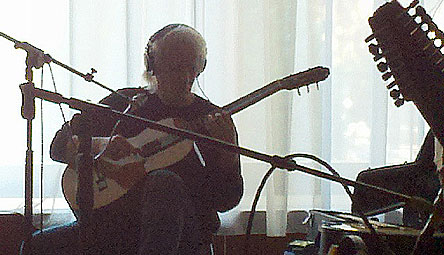 there
was very palpable; you could sense them. It was at once haunting,
mysterious, and mystical. There was a presence there. It was a
solemn, quiet place. That kind of history and atmosphere has an
effect on you. I believe that atmosphere carried over into the
tracks of Triptych. Becoming was also recorded in
Hungary, but in a concert hall as recording studio. I loved both
locations; each seemed to draw something unique out of us. The day
we recorded Triptych in 2009 was the first time I’d ever
played with Balázs. We had an immediate connection; we were both
familiar with each other’s work prior to meeting, but once we met,
there was a soul connection there that seems to have existed prior
to our meeting. I think that comes across in the recorded
performances. I had heard Balázs on various recordings before we
met, and I knew that he was not merely a gifted percussionist, but a
true artist. For Becoming, it was a very joyous occasion, as
by this time we had grown even closer, both as friends and as
artistic collaborators. We’d not seen each other in three years, so
the joy we felt from being reunited and having such different
instruments and growth was palpable in the sessions. Sándor and I
are soul mates, and we always have a very strong, very deep
connection any time we play together. Performing and recording with
Sándor and Balázs is like being in church in that it is a very
reverent ritual that comes from and speaks to our souls. I feel very
honored to have been a part of this, to be able to perform and
record with such gifted, soulful, and unique world-class artists
such as Sándor and Balázs. there
was very palpable; you could sense them. It was at once haunting,
mysterious, and mystical. There was a presence there. It was a
solemn, quiet place. That kind of history and atmosphere has an
effect on you. I believe that atmosphere carried over into the
tracks of Triptych. Becoming was also recorded in
Hungary, but in a concert hall as recording studio. I loved both
locations; each seemed to draw something unique out of us. The day
we recorded Triptych in 2009 was the first time I’d ever
played with Balázs. We had an immediate connection; we were both
familiar with each other’s work prior to meeting, but once we met,
there was a soul connection there that seems to have existed prior
to our meeting. I think that comes across in the recorded
performances. I had heard Balázs on various recordings before we
met, and I knew that he was not merely a gifted percussionist, but a
true artist. For Becoming, it was a very joyous occasion, as
by this time we had grown even closer, both as friends and as
artistic collaborators. We’d not seen each other in three years, so
the joy we felt from being reunited and having such different
instruments and growth was palpable in the sessions. Sándor and I
are soul mates, and we always have a very strong, very deep
connection any time we play together. Performing and recording with
Sándor and Balázs is like being in church in that it is a very
reverent ritual that comes from and speaks to our souls. I feel very
honored to have been a part of this, to be able to perform and
record with such gifted, soulful, and unique world-class artists
such as Sándor and Balázs. SÁNDOR SZABÓ: Speaking about the chemistry between musicians is a metaphysical topic for me. Briefly I can say, because this is my experience, that when we improvise in trio and the music flows we are ONE soul. Our individual souls just being unified and the music is born in this state. For this tour and recordings, Kevin had to cope with a big problem, he could not bring his usual instruments and he had to use my 12 string bass/baritone guitars. He actually prepared to a different sound but finally his inner strength was the winner, he played brilliantly on those monsters and it did not destroy the chemistry. We also decided that at last we try all the given possibilities. Since the recording was in my hometown I could use many of my guitars, we could use my huge guzheng and a concert piano. This created a very prolific music situation at that moment. Of course we all were in good mental shapes and due to it the recording session brought up something of us that we could never reach before. Actually the music was there and we just had to “touch” it to bring it up. It was kind of magic. We started to have certain forces work. 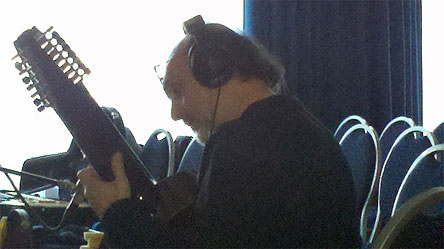 BALÁZS
MAJOR: The chemistry is the kind of thing which is very
difficult to describe. It is an experience that the musician has to
have empathy. When I feel the chemistry I feel that the music just
happens by its own. In such a situation I do not have to think or
count. It just flows. When playing with Kevin and Sándor I feel a
huge confidence, when you are on a flight and you trust the pilot
and you know that nothing wrong can happen. The same in the music
with them. This is a gift from the life and it happens not with
everybody and not any time. I think we played in such a blessed
state when recorded the Becoming album. BALÁZS
MAJOR: The chemistry is the kind of thing which is very
difficult to describe. It is an experience that the musician has to
have empathy. When I feel the chemistry I feel that the music just
happens by its own. In such a situation I do not have to think or
count. It just flows. When playing with Kevin and Sándor I feel a
huge confidence, when you are on a flight and you trust the pilot
and you know that nothing wrong can happen. The same in the music
with them. This is a gift from the life and it happens not with
everybody and not any time. I think we played in such a blessed
state when recorded the Becoming album. mwe3: What is it like as a trio playing with each other? How is the chemistry and how do you interact; it seems so different from the duo works of Sándor and Kevin. KEVIN KASTNING: For me, the chemistry is very similar in both settings. There is a deep connection with Sándor and I, and with Balázs and I, and between the three of us. It’s been there since the first time we met. That strong bond and the chemistry allows the music to flow. Even though we all come from such divergent backgrounds and influences, we speak the same artistic language; we may be coming from different places, but we’re headed in the same direction. I think you can hear that on Becoming. SÁNDOR SZABÓ: The chemistry is very strong with Balázs and also with Kevin. When we started to record the Triptych in 2009, Balázs and Kevin met and saw each other for the first time and I had a little fear if they could play together at all, but it turned out in the first minutes that no reason to fear because they felt each other’s reaction so well. As for me and Balázs we have been playing since 30 years and we have a really telepathic contact on stage and studio. With Kevin we have a very deep and sensitive chemistry which is very inspiring for me. When we met first time (in 2006) and started to play my first impression was that Kevin reacts in a merely different way while improvising than any other guitar player. I was kidding with him and asked if he 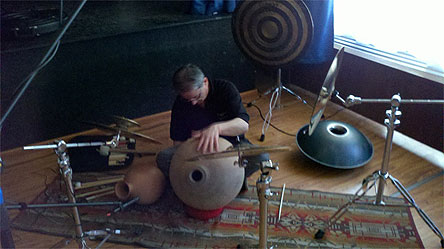 arrived
from another solar system, because he is so different from any known
guitar players, and this is very inspiring to me. I can also thank a
lot to him because I really needed such an inspiring partner to
develop. I always felt kind of loneliness as a guitar player because
most of the available guitar players are thinking in styles and
systems which puts the music into prison. The jazz guitar players
are not polyphonic players, the classical guitar players cannot
improvise and the fingerstyle players are narrow minded, so I really
needed to find someone. It was Kevin. arrived
from another solar system, because he is so different from any known
guitar players, and this is very inspiring to me. I can also thank a
lot to him because I really needed such an inspiring partner to
develop. I always felt kind of loneliness as a guitar player because
most of the available guitar players are thinking in styles and
systems which puts the music into prison. The jazz guitar players
are not polyphonic players, the classical guitar players cannot
improvise and the fingerstyle players are narrow minded, so I really
needed to find someone. It was Kevin.The interaction is different in duo and trio situations. In a duo, the music can flow to any direction with a big freedom but demands a very serious control and responsibility for the end result. We always sit down to improvise with the inner need that the piece should sound as if it were composed, after all the improvisation for us is actually real-time composing. In trio we have less work and we have bigger discipline to build the music with the best notes and there is no competition in such a creative process. In duo and trio situations we have to get to a creative mental state where our souls unify. From this point the improvisation is a much deeper and complex process and it cannot be described with learning and using all scales and all chords. mwe3: Can you say something about the various guitars and the various percussion instruments featured on Becoming and what other instruments did you use to further color the sound? How about the microphones used to capture, color and enhance the recorded sound? KEVIN KASTNING: I was at a bit of a disadvantage on the 2012 tour and for the recording sessions, as I had none of my own instruments there. The Lacey Act in the US is having a very negative and restrictive effect on American artists that tour abroad, so I was unable to take my usual instruments with me for the tour. Sándor was kind enough to make his instruments available to me for the tour and recordings. His 12-string bass-baritone is based on and modeled after my own 12-string bass-baritone, so there was some familiarity there. In fact, he has a pair of them, so I was able to keep one in octave tunings, and one in my own altered tunings. However, this is no longer my main instrument; nor an instrument I’ve used at all since 2010 when I moved to the 16- and 17-string Contraguitars. Had it not been for the fear and uncertainties of the Lacey Act, I would have been on tour with one of the Contraguitars, but sadly this was not to be. The lack of my Contras made me feel a bit restricted and limited; not really at home, but I don’t think the recordings suffered; in fact I think both records turned out pretty well. I also used an instrument of Sándor’s which is a baritone (long-scale) classical guitar, tuned a fourth lower than concert classical guitar. The sound of it is deep and sonorous, but before that day in the concert hall recording sessions, I had never played it. Sándor asked if I’d like to use it, and as soon as I heard it, I knew I wanted it to be part of these recording sessions. It has a rather unique texture, and I knew it would meld into the trio fabric. So it was a bit of a strange circumstance for me, being in a recording studio without any of my instruments, and performing on three instruments which I’d never played. Fortunately, I 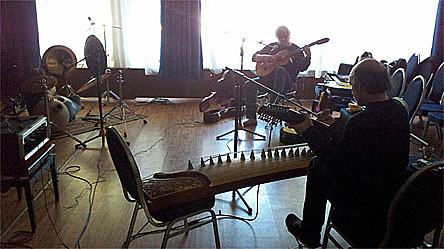 acclimated
pretty quickly and we were able to make everything work. I had the
instruments with me at the hotel, and I had been up most of the
night preceding the recording date practicing and learning the
instruments. So not only was I recording on three unknown
instruments, I was running on very little sleep! There was a
Steinway grand in the concert hall, and once we arrived and I played
it a bit, I asked Sándor and Balázs if they’d mind if we had some
piano on this record, and they both agreed. I’d never played this
Steinway either, so that’s four unknown instruments for me on this
session and also for Book of Crossings. For the piano parts
on Becoming, I had the lid open on the Steinway, and not only
played the piano using the keyboard, but also used some wooden
spoons and my hands on the actual piano strings inside the piano;
using it more as a percussion instrument really. The following day
for the Book of Crossings sessions, I was playing the piano
in a more traditional way, but still using my hands on the strings
inside the piano a little. Part of the sound of these two albums was
the concert hall itself. The room sounded good and was a very good
location for recording. It was an unusual space in that one long
wall was all floor-to-ceiling glass windows that overlooked a
courtyard. The sessions took place on bright spring days, and the
trees in the courtyard were full of Hungarian birds holding their
own performance. If you listen closely, you can hear them in some
places on both albums. During soft or quiet passages in the music,
when we were recording, I could hear the birds coming back through
the headphones and it made me smile. Mics on Sandor and I were the
German-made Gefell M-930, which is one of my favorite microphones
ever. Both records were beautifully mixed and mastered by Sandor at
Tandem Records Experimental in Hungary. The cover art on both
records is by a British photographic artist named Chris Friel. I
have a deep admiration of his work, and his pieces on the covers
really fit and expressed the atmosphere of each album very very
well. acclimated
pretty quickly and we were able to make everything work. I had the
instruments with me at the hotel, and I had been up most of the
night preceding the recording date practicing and learning the
instruments. So not only was I recording on three unknown
instruments, I was running on very little sleep! There was a
Steinway grand in the concert hall, and once we arrived and I played
it a bit, I asked Sándor and Balázs if they’d mind if we had some
piano on this record, and they both agreed. I’d never played this
Steinway either, so that’s four unknown instruments for me on this
session and also for Book of Crossings. For the piano parts
on Becoming, I had the lid open on the Steinway, and not only
played the piano using the keyboard, but also used some wooden
spoons and my hands on the actual piano strings inside the piano;
using it more as a percussion instrument really. The following day
for the Book of Crossings sessions, I was playing the piano
in a more traditional way, but still using my hands on the strings
inside the piano a little. Part of the sound of these two albums was
the concert hall itself. The room sounded good and was a very good
location for recording. It was an unusual space in that one long
wall was all floor-to-ceiling glass windows that overlooked a
courtyard. The sessions took place on bright spring days, and the
trees in the courtyard were full of Hungarian birds holding their
own performance. If you listen closely, you can hear them in some
places on both albums. During soft or quiet passages in the music,
when we were recording, I could hear the birds coming back through
the headphones and it made me smile. Mics on Sandor and I were the
German-made Gefell M-930, which is one of my favorite microphones
ever. Both records were beautifully mixed and mastered by Sandor at
Tandem Records Experimental in Hungary. The cover art on both
records is by a British photographic artist named Chris Friel. I
have a deep admiration of his work, and his pieces on the covers
really fit and expressed the atmosphere of each album very very
well.SÁNDOR SZABÓ: This is a very special album for me because I can hear only my guitars on this CD. I used a newly developed tuning on my old 16 string guitar and also on a small Brazilian 10 string guitar called viola caipira. These guitars really stretched the harmony possibilities which was very inspiring to Kevin and Balázs. He got his new udu drum which has a very deep sub-bass range and that made the sound almost hypnotic. Balázs was deeply inspired of his new sound and new possibilities because he worked years to combine the Indian, African clay drum techniques with the cymbals. By now he created a very distinct sound which is a mark of the sound of the Becoming. We used close microphone settings. For the percussion we used a pair of DPA 4011 and for the guitars we used Gefell 930s through an RME mic preamp. As for the recordings and the mixing, I have a special simple conception and I keep it every time. This conception goes completely against the current recording habits and fashions. I never use EQ, limiter, or compressor. Many sound guys state that it is not possible to make a decent mix without them. My opinion is opposite: it is possible and highly recommended if we want to capture something of the fine details of the music. I used to mix 36 tracks without limiting and compression. It is possible but the world is going to the loudness… 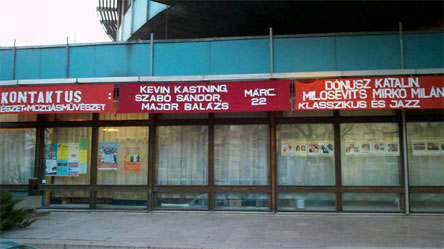 BALÁZS
MAJOR: In the last three decades we spent together with Sándor
somehow pushed me to a certain direction in the percussion setup and
playing. As I always played near very special and fine acoustic
guitars I had to think to find a percussion instrument setup which
would never disturb the range of the guitars and would fill out the
gaps in the frequency range. For this the udus and the cymbals
proved to be proper. Since I studied and played jazz drums I just
imported the cymbals from the drum set. I also used to studied and
played the North Indian tabla. In the last decades I synthesized the
western jazz rhythm with the Indian tabla rhythm system. This is
what you can hear from me. Of course I was influenced by some great
percussion players but I wanted to create my own sound and rhythm.
My plan is to develop my cymbal sets to get an even more and
distinct sound around the guitars. BALÁZS
MAJOR: In the last three decades we spent together with Sándor
somehow pushed me to a certain direction in the percussion setup and
playing. As I always played near very special and fine acoustic
guitars I had to think to find a percussion instrument setup which
would never disturb the range of the guitars and would fill out the
gaps in the frequency range. For this the udus and the cymbals
proved to be proper. Since I studied and played jazz drums I just
imported the cymbals from the drum set. I also used to studied and
played the North Indian tabla. In the last decades I synthesized the
western jazz rhythm with the Indian tabla rhythm system. This is
what you can hear from me. Of course I was influenced by some great
percussion players but I wanted to create my own sound and rhythm.
My plan is to develop my cymbal sets to get an even more and
distinct sound around the guitars.mwe3: Can you let the readers in on news concerning any new guitars, percussion instruments or other gear that you’re using now or planning to feature or would like to feature on upcoming recordings? KEVIN KASTNING: A couple of months ago, I received an instrument on which I’d been working for a long time and of which I’d been dreaming for years: the double neck 30-string Contra-Soprano guitar. You can see it here. This instrument was a collaboration between myself and Emerald Guitars in Ireland. I’ve already used this instrument on two album projects; you’ll hear it on the forthcoming albums of myself and Carl Clements, and the next one of Mark Wingfield and myself. Both of those albums will be released on Greydisc in 2013; the recording sessions for both are completed. Of course I’m using the 16- and 17-string Contraguitars, 12-string Alto guitar, classical guitar, fretless, and a few others on both of those recordings, too. The 30-string Contra-Soprano guitar has already had and is having a massive impact on my music and my is altering my thought processes. It is really three instruments for me: an 18-string Contraguitar, a 12-string Soprano/Alto guitar, and a single 30-string Contra-Soprano guitar when I utilize both sets of strings on both necks simultaneously; in other words, instead of approaching it as two single instruments, I approach it as a single instrument with 30 strings. This obviously requires an entirely new technique for 30 strings, especially for the right hand, along with new tunings and new compositional approaches, forms, directions, and thoughts. One of the differences in the approach with the 30-string is that I play the instrument positioned vertically, like a cello. The 30 has two sound holes, and as such is a natural stereo instrument. It requires a different microphoning approach in the studio, but sounds glorious on tape. I will be using the 30-string on a very special album project with Sándor later this year 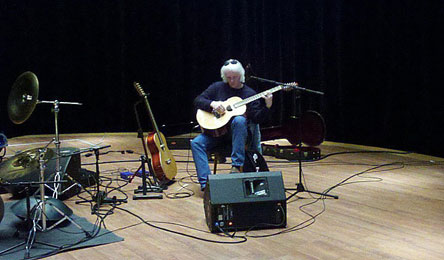 that
we’re calling the 46-string project. This will be duo compositions
wherein Sándor will be using his only his 16-string instruments, and
I will be using only my 16-string, 17-string, and 30-string
instruments. That album should be released in 2014, and I am excited
about this record. I have a few other projects for this year in the
works with other artists as well; some familiar names with whom I’ve
never worked. I’ll be announcing those on my web site later this
year. Michael Manring and I have discussed our next album project.
I’ve also started work on my first solo album, though I’m not sure
when that will be released. It will involve the 30-string and the
16- and 17-string Contraguitars and a few other instruments, too. that
we’re calling the 46-string project. This will be duo compositions
wherein Sándor will be using his only his 16-string instruments, and
I will be using only my 16-string, 17-string, and 30-string
instruments. That album should be released in 2014, and I am excited
about this record. I have a few other projects for this year in the
works with other artists as well; some familiar names with whom I’ve
never worked. I’ll be announcing those on my web site later this
year. Michael Manring and I have discussed our next album project.
I’ve also started work on my first solo album, though I’m not sure
when that will be released. It will involve the 30-string and the
16- and 17-string Contraguitars and a few other instruments, too.I’m also working with Dan Roberts at Daniel Roberts Stringworks on a highly unusual classical guitar. I love the voice of the classical guitar, but I feel restricted on 6 strings. This guitar won’t have that restriction. Dan is the brilliant luthier that made both my Contraguitars. I wouldn’t be able to do what I do without Dan; he’s like my unseen partner; a collaborator. He and I have been working on instruments together since 1999. And with the advent of the 30-string, Alistair Hay at Emerald in Ireland has become a contributor to what I do as well. I am deeply grateful to them both; they are true artists and adventurers. SÁNDOR SZABÓ: Actually I ordered a 16 string lute and playing it will be a big challenge to me to match it to my music and sonic world. I have to work out a special recording method because the lute is very silent and radiates the sound waves differently than the guitar. On the top of all I use the same finger nail picking on the lute as on my guitars, so due to this my lute will be somewhat different than a traditional lute. BALÁZS MAJOR: As for future musical plans, I am working on very special new grooves and textures preparing to a new trio recording when Sándor wants to play his 16 string lute and Kevin his double neck 30 string monster... These instruments demand a very special approach from me. mwe3: What was it like recording the Becoming album in Hungary and how did the recording of Becoming that day color and influence your concert performance that same night in March 2012? Also can you say something about Hungary for those of us who have never been there? What’s the music scene there like and how does the country itself impact the music, as well as your music and can you say something about other musical artists from there? Hungary seems like a very musical kind of place with lots of history and intrigue. KEVIN KASTNING: The day we recorded Becoming was a bright and warm spring day in Hungary with perfect blue skies and flowers blooming everywhere. Coming from my home in New England where it was still very much winter and snow was on the ground; then to be suddenly immersed in spring was a pleasant turn. The setting for these sessions was in a small concert hall in the large performance complex where we were to be performing in the main hall later that night in Vac, Hungary. This small concert hall became our recording studio for the day. It was very informal and relaxed, and in a way, it felt as if the warmth and the spirit of spring was there with us inside the hall, not just outside. We tracked for most of the day, taking tea breaks and stepping outdoors into the welcoming Hungarian spring. Time evaporated, and before I knew it, it was time to pack up and head over the large hall for the show. The performance that night almost seemed to be a continuation of the recording sessions, even though we were performing pieces from and based on the Triptych album. 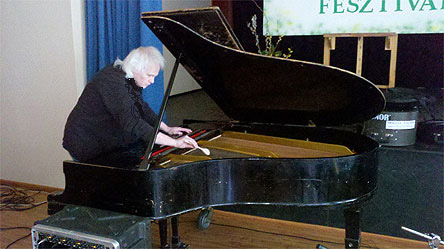 To
answer your question about Hungary, it is a magical place. The
country is rich in history and deep ritual. It’s a beautiful
country. When I’m there, I can feel the spirit and essence of this
history; it permeates the air and creates something like an
immersive atmosphere; this is deep and palpable. The Hungarian
people are incredibly warm and friendly; I am always treated
exceedingly well when I am there. Budapest is a fantastic city;
Sándor and I have taken some very long walks there, and around every
corner is something new to me. Hungary has a different feeling than
any other country I’ve visited; I’m never quite ready to leave when
I’m there, and I’m always ready to return. I can feel this energy
when I perform or record there; I feel the recording sessions are
influenced by the atmosphere. Hungary seems to be filled with
historical shadows of mystery and secrets; it’s all around you. You
can’t always see it, but you can feel it. To
answer your question about Hungary, it is a magical place. The
country is rich in history and deep ritual. It’s a beautiful
country. When I’m there, I can feel the spirit and essence of this
history; it permeates the air and creates something like an
immersive atmosphere; this is deep and palpable. The Hungarian
people are incredibly warm and friendly; I am always treated
exceedingly well when I am there. Budapest is a fantastic city;
Sándor and I have taken some very long walks there, and around every
corner is something new to me. Hungary has a different feeling than
any other country I’ve visited; I’m never quite ready to leave when
I’m there, and I’m always ready to return. I can feel this energy
when I perform or record there; I feel the recording sessions are
influenced by the atmosphere. Hungary seems to be filled with
historical shadows of mystery and secrets; it’s all around you. You
can’t always see it, but you can feel it.SÁNDOR SZABÓ: As I mentioned those days we were very inspired by a lot of things, each other, new instruments and the nice weather and vibes. This of course influenced also the concerts where we played with two contact dancer women. Everything was just perfect. Well Hungary is a very special place. There are very strong magic forces here and sensitive people feel it. The music life is very vivid and intense here in spite of that almost nobody plays guitar music in such ways as we do, but all other kind of music is played. The guitar music has not much respect in this country, that is why I started to focus my entire career to abroad from the beginning. Unfortunately everything is going to a commercial direction and the real music values are hidden. The Hungarian culture is over globalized and that is why the rap for example is much more popular than our folk music, not to mention the guitar music. BALÁZS MAJOR: After we recorded the Becoming we had a completely new approach on the concerts. It was interesting that we actually toured with the Triptych material but the Becoming was already there. It was a magical tour. As for Hungary this country is really beautiful but it is not so easy to be a musician in this country. The real artists are in the periphery and only some lucky working musicians can get along fighting with each other and the circumstances. That is why I do not want to take part in this constant fight, so I try to earn money by doing other things, I do not want to compromise my art after all I spent almost a lifetime to get to this artistic level. So very similarly to Sándor I just do what I have to do and I do not take part in the Hungarian music scene. Of course this is not a complaint it is just a way of life; a possible approach to live here as an artist. Apart from this I feel happy especially when I can play and record with such guys. mwe3: What about other musical plans, current (regarding Becoming) as well as other future plans, from the three musicians on the Becoming album? And what are your hoping that guitar lovers, musicians as well as music lovers and CD fans in general, will come away with after listening to Becoming? KEVIN KASTNING: With the three of us living in different countries, it is difficult to make concrete trio plans, but I know we’re all committed to continuing the trio. That said, I am certainly looking forward to the next trio recording project. If that doesn’t happen as a “live” in-studio performance like Triptych and Becoming, we can still do it by tracking in separate studios at different times. There is a European tour in the works for 2013 or 2014, and part of the tour schedule will include recording sessions for one or more new album projects in trio, and in duo with Sándor and I. On our next tour, I will be touring and recording with the 30-string. 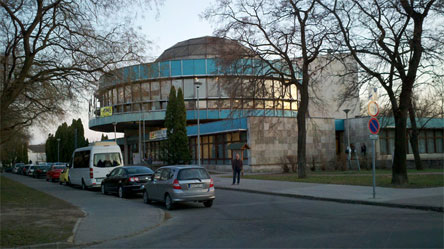 As
for what people take away from Becoming, I hope that each
listener will find their own meanings and images in it. It is a
pretty diverse set of pieces; each with different meanings and
emotions and atmospheres and passageways. I don’t mean this in an
arrogant way, but I don’t wonder if other musicians will like it;
this music exists because it has to; it’s not created with the hopes
that someone will like it. It doesn’t come from me; it originates
somewhere else, and when it is manifesting itself either in concert
or in a recording studio, I’m not wondering or hoping that others
will like it. That’s not why it exists. Though I do hear from people
who share with me their impressions of the records and share with me
what our music means to them; for this I am deeply grateful and
humbled. I don’t wonder what other guitarists will think of my
records; I suspect that’s because I’m not sure I see myself as a
guitarist because I don't think of the Contras and the 30-string as
guitars. Well, not a 6-string guitarist, anyway. I guess I think
of myself more as a performing composer. Now that I’m evolving into
the world of the 30-string instrument, I don’t even think of the 16-
and 17-string Contraguitars or the 30-string as “guitars,” really.
Maybe that's part of it: I don't think of them as guitars; hence I
don't think of myself as a guitarist. I
have more of a pianistic and orchestral concept and approach to
them; they are so vast and deep that I can’t approach them as or
think of them merely as guitars. I think that word is too limiting
for these instruments. The two Contras and the 30-string are each
like discovering a new planet. When I sit down with the 30-string, I
feel like a conductor stepping up on the podium before an orchestra.
Each demands a different technique; each one is literally learning a
new instrument. This process is very arduous and challenging, but to
have these kinds of deep and vast orchestral textures of instruments
available to me makes overcoming these difficulties more than
worthwhile. As
for what people take away from Becoming, I hope that each
listener will find their own meanings and images in it. It is a
pretty diverse set of pieces; each with different meanings and
emotions and atmospheres and passageways. I don’t mean this in an
arrogant way, but I don’t wonder if other musicians will like it;
this music exists because it has to; it’s not created with the hopes
that someone will like it. It doesn’t come from me; it originates
somewhere else, and when it is manifesting itself either in concert
or in a recording studio, I’m not wondering or hoping that others
will like it. That’s not why it exists. Though I do hear from people
who share with me their impressions of the records and share with me
what our music means to them; for this I am deeply grateful and
humbled. I don’t wonder what other guitarists will think of my
records; I suspect that’s because I’m not sure I see myself as a
guitarist because I don't think of the Contras and the 30-string as
guitars. Well, not a 6-string guitarist, anyway. I guess I think
of myself more as a performing composer. Now that I’m evolving into
the world of the 30-string instrument, I don’t even think of the 16-
and 17-string Contraguitars or the 30-string as “guitars,” really.
Maybe that's part of it: I don't think of them as guitars; hence I
don't think of myself as a guitarist. I
have more of a pianistic and orchestral concept and approach to
them; they are so vast and deep that I can’t approach them as or
think of them merely as guitars. I think that word is too limiting
for these instruments. The two Contras and the 30-string are each
like discovering a new planet. When I sit down with the 30-string, I
feel like a conductor stepping up on the podium before an orchestra.
Each demands a different technique; each one is literally learning a
new instrument. This process is very arduous and challenging, but to
have these kinds of deep and vast orchestral textures of instruments
available to me makes overcoming these difficulties more than
worthwhile. SÁNDOR SZABÓ: We did not make long term plans for the trio project like the Becoming album. It just happened and I hope something similar will happen in the future. We have to face the problem that the  real
art got to a very difficult state and also the traveling became very
expensive, so making recordings between the US and Hungary is
possible only by compromises. In spite of this we plan to make a
very special duo project where we both use our multi-string guitars
16-17-18 and 30 string guitars. This will be a very special
milestone in searching the limits of the guitars and the players in
the guitar music. There is also a plan in my mind where I play my 16
string lute, Kevin plays his 30 string double neck guitar and Balázs
plays his extended percussion set with a lot of new sounding
cymbals. I hope after the listeners taste the sound and soul of
Becoming album they will be hungry for the continuing. real
art got to a very difficult state and also the traveling became very
expensive, so making recordings between the US and Hungary is
possible only by compromises. In spite of this we plan to make a
very special duo project where we both use our multi-string guitars
16-17-18 and 30 string guitars. This will be a very special
milestone in searching the limits of the guitars and the players in
the guitar music. There is also a plan in my mind where I play my 16
string lute, Kevin plays his 30 string double neck guitar and Balázs
plays his extended percussion set with a lot of new sounding
cymbals. I hope after the listeners taste the sound and soul of
Becoming album they will be hungry for the continuing. BALÁZS MAJOR: I believe that the Becoming sounds very special like no other records in the world. I really want to add even more from my ideas to a next recording which hopefully can happen in 2013. I am able to listen to Sándor’s and Kevin’s duo albums like an outsider. These guys created a new sound and a new style in spite of the music world does not want to notice this fact. This new genre is very inspiring for me because it demands a consciousness from me as the third member in a trio which really creates a new genre in these days. Photos above from the recording sessions for Becoming; March 22 2012; Vac, Hungary. Thanks to KEVIN KASTNING, SÁNDOR SZABÓ and BALÁZS MAJOR |
||